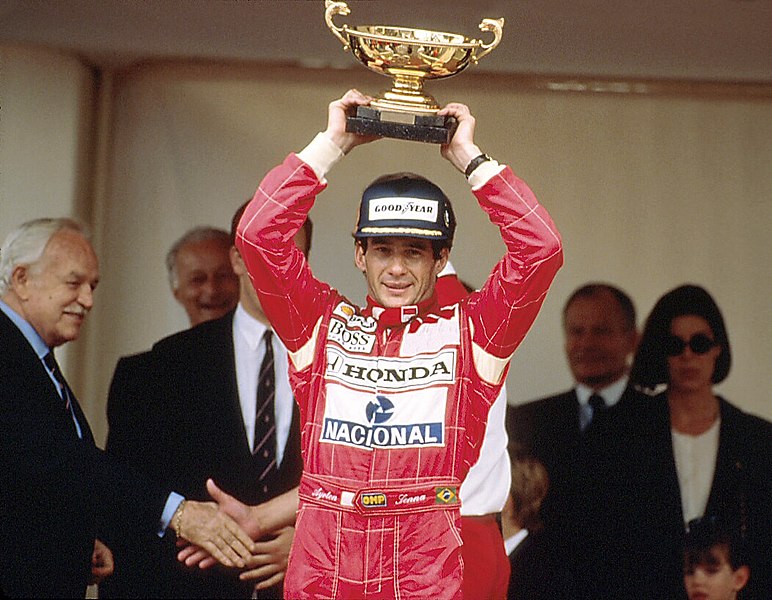25 years since F1 lost Ayrton Senna and why his legacy lives on
Twenty-five years ago, over three million people lined the streets of São Paulo to mourn the passing of Ayrton Senna. Senna was neither a politician, nor general, nor royal, but a racing driver. It is a testament to Senna that his death caused such an outpouring of grief, hitherto unseen for any sportsperson. Senna’s legacy, both for Formula 1 and beyond, merits exploration and explanation.
If a new fan coming to Formula 1 were to glance at the all-time drivers’ statistics, they would see Michael Schumacher dominant with seven world championships and 91 wins. Looking further down they would see Lewis Hamilton, Juan Manuel Fangio, Sebastian Vettel, and Alain Prost all resplendent. Finally, they would come to Ayrton Senna, with a respectable three world championships and 41 wins from 161 race starts. Yet statistics obscure the real story, that Senna is the single driver who had the greatest impact upon Formula 1.
It is impossible to follow Formula 1 in any capacity without facing up to Ayrton Senna
Even for fans like myself, who are too young to have seen Senna drive, his legacy is an overbearing, yet complex one. It is impossible to follow Formula 1 in any capacity without facing up to Ayrton Senna, impossible to surround yourself in the sport without engaging with Senna’s story. Asif Kapadia’s 2010 documentary film, which explores Senna’s life, describes Senna as “genius, maverick, outsider, superstar, legend”. The implication being that Senna was many things, and it is difficult to reconcile the different facets of his character.
It is often remarked that Senna had both a great capacity for empathy and at times a conspicuous lack of it. Many incidents bear this out. In practice for the 1992 Belgian Grand Prix, Erik Comas crashed heavily and lost consciousness with his car still running. In an astonishing act of selflessness, Senna stopped on the active circuit, risked his own life to run to Comas, switch his engine off, and make sure he could still breathe. Comas would later remark that Senna probably saved his life. This was one side of Senna, capable of the greatest compassion. However, two years earlier, Senna had risked both his life and that of Alain Prost in an intentional 150mph crash that Senna saw as justice, and which gave him his second world championship.
What attracts people to Senna most is his pure ability as a driver
Despite the complexities of his character, what attracts people to Senna most is his pure ability as a driver. In 2009, Autosport asked 217 Formula 1 drivers who they ranked as the ‘greatest’ of all time, leaving the definition of greatest up to the individual. Senna came first on this list. Similarly, the BBC’s ranking of the 20 greatest drivers of all time named Senna as the best.
Senna’s career straddled the era where onboard cameras became more common in Formula 1, thus while we can still watch some of his greatness, much of it remains shrouded in mystery. For instance, in the 1988 Monaco Grand Prix, Senna qualified on pole 1.4 seconds (an age in F1 terms) ahead of his teammate Alain Prost. Prost is another all-time great, and yet in the same car, Senna found 1.4 seconds. By most this is revered as the greatest lap in the history of the sport, and though footage does not exist, Senna’s own description of the lap created a legend around it. Senna himself said that he had an existential experience while driving that lap. He said: “I was kind of driving it by instinct, only I was in a different dimension. I was way over the limit but still able to find even more.”
The great drivers who followed him bear testament to how influential Senna was
It was not only outright speed which Senna boasted but great endurance. Having never won his home race, he seemed set to do just that in 1991, however, his gearbox began to falter, and he had to finish the final laps of the race stuck in sixth gear. The effort of just keeping the car going would have stopped many other drivers, but Senna managed to win the race. Afterwards, he was so exhausted that he had to be lifted from the car, barely able to lift the trophy on the podium.
The great drivers who followed him bear testament to how influential Senna was. The great Michael Schumacher broke into tears on realising he had equalled Senna’s total of wins, and current world champion Lewis Hamilton pays homage to his hero Senna through his helmet design. Outside of F1, the Instituto Ayrton Senna continues to provide aid to young Brazilians. Though Ayrton Senna passed away 25 years ago, his legacy is one that looms over Formula 1 and the world beyond. The remembrance of his story is not one that will end anytime soon.

Comments